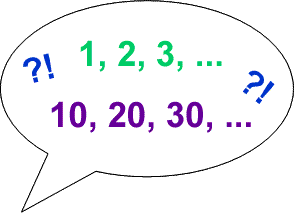Copyright © University of Cambridge. All rights reserved.
'Which Is Quicker?' printed from https://nrich.maths.org/
Show menu
Why do this problem?
This problem could be used as a short one, suitable for the start of a lesson, but it could also be explored more fully and therefore take more time. It will help learners to come to a deeper understanding of how the number system works and can also be extended to cover various multiplication tables.
Possible approach
You could start by simply asking the whole class the question "Which is quicker, counting up to $30$ in ones or counting up to $300$ in tens?". Give pairs the chance to think together before discussing conclusions with the whole group. Encourage pupils to explain how they decided upon their answer, as well as the reasons. You could ask for volunteers to come up and do the counting so you can test out the class's predictions.
When they have done the suggested examples, learners could make up some of their own to work on and then try them out on others. You might want to place constraints on these, for example, can they find an example where they predict the two countings would take the same length of time?
At the end you could ask about their results and the factors that affected the speed at which they were able to count. It is likely that as well as mathematical reasons, there will be some practical considerations too, such as being very familiar with counting in some ways compared with others. As well as the number of numbers to say the length of the number words will also be significant: it will take longer to say $134$ than $34$.
Key questions
Possible extension
Learners could extend this to such things as counting tens of thousands, counting in $7$s from $70$ to $140$, counting in steps of $0.1$ from $0.1$ to $1$ or counting in fractions such as tenths or eighths.
Possible support
Some children may like to stick to counting in $10$s, $100$s, $2$ and $5$s, or other steps with which they they feel comfortable. Some learners may like to write down the numbers they are counting before being timed.
